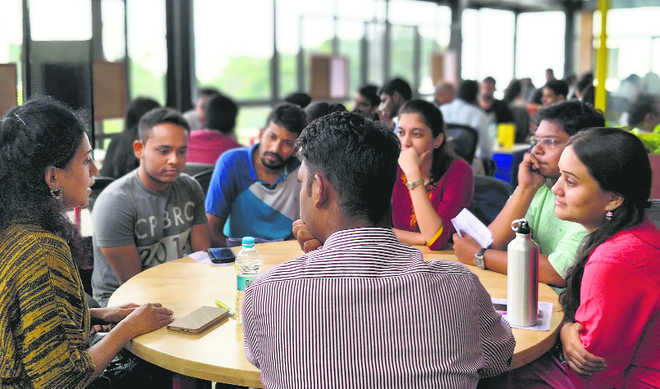The Human Library!
Suresh Dharur in Hyderabad
Malathi, a victim of domestic violence, was so depressed with her life that she even thought of committing suicide to end the suffering. Almost broken, she found a few people around her to help. They brought her back from the brink; she is a changed person now. This transformation is thanks to Human Library, a concept started by a young social activist, Harshad Fad, in Hyderabad. It’s a library where one gets to interact with “human books” and learn from their life journeys, the journeys that epitomize triumph of human spirit over adversities, prejudices and biases.
The “authors” are the people who tell the stories of their lives to the visitors of the library, the odds that they had faced and how they struggle to overcome them. Like a conventional library, it has a catalogue giving the snapshots and titles of “human books” and what kind of life journey they represent. The visitors can seek an appointment with the “human book” of their choice through the librarian who will then arrange the interaction.
It’s a framework that creates a positive environment allowing people to challenge prejudice and stereotypes through dialogue. Here’s a platform where books are replaced by humans and reading is actually a conversation.
The subjects range from gender violence, sexual abuse, domestic violence and depression to single parents, divorces, transgenders and those pursuing unusual careers.
“Our mission is to create a platform for a two-way interaction on a whole range of prejudices and biases that our diverse society presents. No book can ever give you the kind of learning experience that you get from interacting with people who have gone through so much and survived to tell their tales,” says Harshad, an enthusiast in theatrics, filmmaking and media business.
How it all started?
The first human library started in Copenhagen, Denmark, in 2000. It is an international organization that aims to challenge prejudice against social contact among people. It is a place where real people are on loan to readers.
“I came across the concept while browsing the internet last year. I strongly felt that it should be replicated in India. The first Human Library event in India was conducted at the Indian Institute of Management, Indore, in November last year. I liked the idea and began work to set up the Human Library in Hyderabad. The goal of this event-based programme is to help people appreciate differences, understand social barriers by listening and relating to their experiences,” Harshad said.
The Hyderabad chapter was opened in March this year and it now has 45 ‘human books.’ “We want to build a positive platform to inspire others,” Harshad says.
“Those who visit, borrow these books, have a conversation with the ‘human book’ and leave with a widened perspective on different social groups in our society,” he says.
The “Human Library” is a social start-up with no business goals, no revenues to be earned or profits to be made. It is just a group of volunteers driven by a common passion. “We are now reaching out to as many young people as possible by organizing campus events once a month. The response has been overwhelming. There are certain problems peculiar to the younger generation including exam stress, anxiety and depression that need to be discussed openly,” the activist said.
Concept is catching up
Within a few weeks of starting the Hyderabad chapter, India’s first, the idea caught the imagination of people across the country, thanks to the discussion forums in the social media. There has been an instant recognition of its potential in a diverse society like India. “We now have nine chapters across the country including Delhi, Mumbai, Pune, Chennai, Bengaluru, Indore and Patiala. We are in touch with volunteers from Kerala and very soon we expect a similar initiative to start there,” says Harshad.
The Hyderabad chapter has so far conducted 12 events, each evoking tremendous response from visitors. “Typically, 200 to 600 people attend our events where human books share their experiences with visitors in groups,” he explained.
How do they impact the visitors? “There were many instances where people come to us to tell how their interaction with the human books have changed their world-view and how they are now looking at life with a different perspective,” Harshad recalls. “After one such event on ‘gender conundrum’, a college girl walked up to us and told us that she used to heckle transgenders and mock at their conduct. But, after listening to the life story of a transgender at the event, she was a changed person,” he said.
The next event of the Human library would be conducted at the Hyderabad Literary Festival slated for January. Talking about the future plans, Harshad said, “We are in touch with Dhaka chapter of Human Library and exploring how we can take the idea to the next level.”
Harshad, who recently completed Masters programme in media business administration from Annapurna International School of Film and Media here, works as a community manager at Kahaaniya.com, an online publishing start-up. “I have thoroughly enjoyed the journey of setting up this Human Library and the most exciting part was to find the right human books representing the issues that we wanted to highlight at our events,” he says.
The event expenses are taken care of through sponsors. “We are constantly receiving invites from various art and cultural venues in the city to conduct the Human Library event at their premises for free,” Harshad says.










